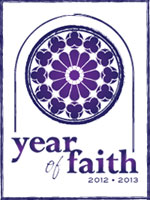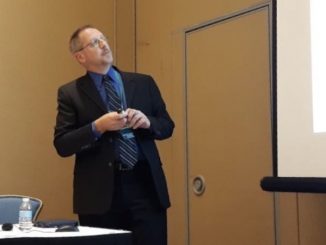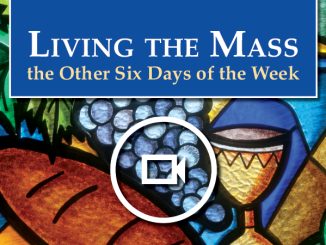WEEK TWO: Sacraments (Celebrating the Christian Mystery)
DAY 2: Learning the Language Spoken in the Kingdom of God (Mystery and Sacramentality)
Recently, I did some research into my ancestry, uncovering stories of forefathers and foremothers who came to the shores of the United States from Poland in the late 19th century. In particular, I was impressed with the story of my great, great grandmother (on my mother’s side), Julia, who, as it turns out, spoke 7 languages fluently, making her transition to the New World, and the Chicago area in particular, so much easier.
Any time we visit or relocate to a foreign country where another language is spoken, it behooves us to learn that language. When we do so, we are much more capable of encountering others and developing relationships whether they be professional or purely social. When you stop to think about it, proclaiming the Gospel amounts to inviting someone to enter into a new place – a “foreign land”, so to speak. The foreign place is called the Kingdom of God. It is a strange new place for many of us. In the Kingdom of God, people act differently, think differently, and live differently. In order for us to adapt to this new “place” called the Kingdom of God, we need to learn the language that is spoken there. Not only is it a language of love, but it is also a language of mystery – a language that often transcends words.
In fact, in the Kingdom of God, words are not the primary form of expression. The inhabitants of the Kingdom of God seem to be more at home with a language that relies less on an alphabet and more on expressions that speak to and prod the imagination. So, just what are the elements of this language of mystery? Let’s take a quick look.
- Sign and symbol
- Ritual
- Movement & gesture
- Silence
- Song
- Story/myth
The language of mystery that is spoken in the Kingdom of God predisposes us to the possibility of an alternate reality. The Kingdom of God is, in fact, an alternate reality to which we are called and to which we are inviting others to relocate. If things were simply as they appeared, we would have no need for the Gospel. However, life’s ultimate meaning is veiled and mysterious. As such, we need to incorporate these various elements of the language of mystery into our souls’ daily diet.
So, where and when in the life of a Catholic is this language most spoken? In the liturgy, of course. When we celebrate the Mass, or any of the sacraments, for that matter, we express ourselves (and are spoken to) using a language of mystery.
- We speak with signs and symbols: water, oil, fire, bread, wine, incense, etc.
- We speak with rituals: sprinkling rites, anointings, blessings, etc.
- We speak with movements and gestures: the Sign of the Cross, processions, the Sign of Peace, etc.
- We speak with silence: after the Scripture readings, after the homily, after Communion, etc.
- We speak with song: hymns of the Mass, sung Mass parts, etc.
- We speak with story and myth: the Liturgy of the Word.
This unique language of mystery not only informs, but more importantly transforms! That’s what the Year of Faith is all about: transforming our hearts and minds to be more like Christ. In the Sacramental life of the Church, we learn to do this by learning to speak God’s language.
Reflection Questions: Choose one of the following questions and share your thoughts with your fellow retreatants by adding your comments in the comments box below this post.
- In what ways is the Kingdom of God a “foreign place” to so many of us? How do we think, act, and live differently in the Kingdom of God?
- What power do signs and symbols have that words alone do not?
- Of the various elements of the language of mystery – Sign and symbol, Ritual, Movement & gesture, Silence, Song, Story/myth – which is your favorite and why?
- How does a language of mystery predispose us to the possibility of an “alternate reality?”
- Describe a time when a ritual action of the Church (in a sacramental rite) spoke powerfully to you.
- What sacramental action(s) do you incorporate into your daily living?
Prayer
Lord, God, you have revealed your saving presence through signs and wonders. This is your language. Help me to open my eyes to the signs and wonders that you continue to reveal yourself through. Help me to enter more deeply into the signs, symbols, and rituals of the Church, so that I may hear your voice and recognize your presence in the celebration of the Sacraments.
Additional Reading
- Finding Infinity Within
- Finding God in All Things
- The Meaning of a Kiss
- What Does Love Look Like?
- Picturing God: Faces & Traces of the Divine
CCC References: 1135 – 1209
◊ ◊ ◊ ◊
I hope you’re enjoying our online summer retreat, Preparing for a Year of Faith! Take a few minutes each day at your convenience to “gather” here on my blog as we seek to add some flavor to our faith lives by deepening our understanding of the truths of our faith as given to us in the Catechism of the Catholic Church.
Learn more about the Year of Faith. Watch a brief video explaining what this online retreat is all about.





The Kingdom of God is a foreign place in that it has its own language and culture. To live as a disciple of Jesus Christ is to commit to living the Kingdom of God in our everyday lives. This can be a challenge because if we live the values and culture of the Kingdom, they may – in fact, will – conflict in many ways with American culture. For me the challenge is to live counter-culturally to the American way in order to proclaim the Kingdom of God with my life in the way I speak and act, the choices I make, and how I interact with others and all of God’s creation.
The Kingdom of God is a “foreign place” to many of us because most of the time people are so worried about him/herselve, their daily routine, their bills, their problems, their sickness, their wants and needs that they tend to forget that others have bigger problems then themself. Many people are oblivious to the fact that the kingdom of God is within each and everyone of us and placing all these concerns in God’s capable hands will lighten their load.
The power of signs and symbols is that they are visual. For many having something concrete in front of them makes things more real. People get caught up in so many things that having an actual sign in front of them allows them to stop and think.
Song and Silence are favorite elements of the language of mystery because through song I feel I can express myself and let go and through silence I can reflect and take time out to place myself in God’s presense. This gives me better focus.
When the priest was baptizing my first child and making the sign of the cross on his forehead brought home to me all that I was asking from God and what would be asked of me. I would need to prepare my child for a life of faith – it would not stop at his baptism but be a journey that both of us would go on together.
I attend mass on a daily basis. Usually first thing in the morning . It is a big part of my daily routine and I plan my day around its centre. Even when we travel abroad my husband and I look for the nearest Catholic church and check out the mass times . I really feel something is missing if I don’t go to mass and receive the Eucharist. Knowing Jesus is with me gives me great strength throughout the day. Also going to confession regularly is very important . It removes any barriers which we put up between ourselves and God and brings us closer to Him.
We speak with movements & gestures is one of my favorites. I find that something as simple as make the sign of the cross before departing out the front door makes my affirmation of stepping out into the world with God’s blessing upon. Doing the sign of the cross my children’ forehead before they go into school speaks the blessings that I want my child to receive upon going through their day that I may not have the time to make an entire blessing prayer. The other day walking past the church, I saw an elderly woman with her little grand daughter doing the sign of the cross and she bent over to show the child how to do it. I observed in awe simply because simple gestures and movements speak a mountain of words, this elderly woman was passing on a cultural tradition and teaching her the faith.
“Describe a time when a ritual action of the Church (in a sacramental rite) spoke powerfully to you.”
Watching the bishop lay hands on a new priest, followed by all the other priests in attendance laying hands, is simply the best.
The sacramental rites of the Church NOW speak powerfully to me…I wish they had when I went through them. I wish when I had gotten married that my husband and I truly realized that we were getting married in partnership with God. I wish I hadn’t been so shy about my faith back then and I would have asked my husband to pray with me or become more involved in the Church with me. We were too preoccupied with our jobs and being newlyweds. Although this year marks our 20th anniversary, we have made great progress but are still not quite where I would like us to be. We had our 3 children baptized, but I think we were too young and ignorant to realize the beauty of the moment. I especially love to watch RCIA candidates make all their sacraments at the Easter Vigil Mass because they are almost fully conscious of what they are doing and they have an understanding and excitement that many do not. There is such beauty to be found in that Mass.
I just read the additional reading “The Meaning of a Kiss”. It brought tears to my eyes. It also reminded me that the sign of peace is a special time for me – extending our hands and blessing each other with Christ’s peace, giving my husband a kiss on the cheek, shaking the hands of little ones and old ones – speaking peace, love with a gesture and a few words. May the peace of Christ be with you.
The most powerful movement for me is receiving the Body of Christ in my hands. I am from the time where we knelt at the altar rail and received the Body of Christ on your tongue.
All that was changed for me with the help of a nun. She told me that I was holding Jesus in my hands.
Describe a time when a ritual action of the Church (in a sacramental rite) spoke powerfully to you.
I was my brother’s sponsor when he was preparing to receive the sacrament of confirmation. The rite of Acceptance in the Order of Catechumens was a ritual that moved me to tears. Performing this beautiful ritual in front of the congregation, I felt so honored by placing a cross necklace from my neck to his. Then the act of the signing of his forehead, ears, eyes, lips, heart, shoulders, hands, and feet. This was my little brother and I was helping to prepare him on his journey to walk with Christ.
I make the sign of the cross daily. That is important to me because it symbolizes me blessing myself feeling close protected by God, and symbolizes me preparing to speak with God thank God connect with God through prayer. I also teach Pre-k and I love teaching them the sign of the cross for the first time.
My favorite element of the language of mystery is Silence. I find it very powerful to sit quietly and reflect on the readings and the homily at mass. It is very meaningful to me to reflect on the readings right after they are proclaimed.